Residents in the IU School of Medicine Department of Obstetrics and Gynecology experience a diverse curriculum in both small group lecture and clinical settings. This program is fully accredited by the Accreditation Council for Graduate Medical Education (ACGME) without warning or probation.
GME training pathways provide residents with additional knowledge and skills alongside the OB-GYN residency curriculum. Pathways are available in leadership, healthy outcomes, medical education and global health.
